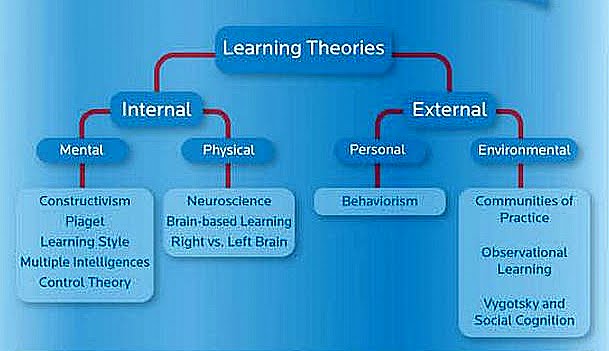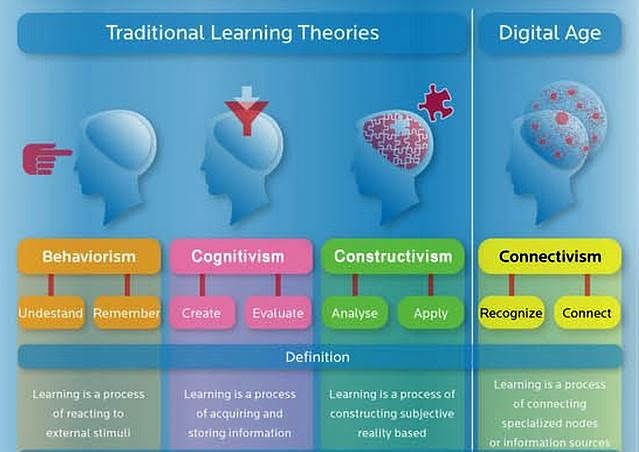This is a learning dilemma that will become increasingly prevalent. You have a stinker of a complex mass of resources and cobbled together ideas to compile into some kind of order only to find that it has been done for you. This is an activity of how understandings of the process of learning has changed over time.
On of our tutors offers a helping hand:
Take your time reading this through and then consider how these historical changes might affect
- the development of educational technologies
- ethical considerations in e-learning research
- research in your own discipline.
There's quite a lot in there. If you want to start just responding to one of the bullet points above, that's fine.
When these modules are designed is proper consideration really given to the students? Who they are? There levels of commitment and understanding? For all the personas I'm familiar with I do wonder.
And that's not even the start of it. We are then asked to look back at week 3 (a month ago), and look for relationships and connections between the narrative we create (above). Then, as if this isn't enough we need to rope in last weeks ethical considerations, and while we're at at put in the 'wider politicalo and social changes'.
Already we have, in my estimation (and this is my sixth postgraduate module and the fifth in the MAODE series) a good 16 hours work to do.
But there's more:
'Consider how the subject you studied for your undergraduate degree has changed over time'.
Post your answers in your tutor group forum and compare them with others.
Across the five groups I think, so far two, sometimes three people, have given this a go. Each could write a chapter in a book (one nearly has)
2 Hours have been allocated to the task.
I repeatedly find that whatever time is given as a suggested requirement for a week's activities that you need to add 50%. So 14 hours becomes 21.
Like a junior solicitor I've been keeping tabs on how long everything takes - and this is someone who is by now, evidentially, digitally literate and familliar with the OU VLE. If you can find 21 hours great. If not then what? If you can handle getting behind or strategically leaving gaps that's fine, but if you feel obliged to get you money's worth and want to do it all then what? And of course life goes on around you: kids off school, elderly relations fall ill, the workload ebbs and flows, the car breaks down ... your Internet connection becomes about as vibrant as a mangle and it snows a bit.
http://edudemic.com/2012/12/a-simple-guide-to-4-complex-learning-theories/
I came across this from edudemic and can't think of anything clearer.

The discussion offers some further thoughts, deleting the word 'traditional' and replacing with classical.
The ifs and buts of the people associated with each of these and how absolute any of them can be, especially connectivism. However, I see connectivism not as the end of a chronological chain, but rather a loop that has people connected and learning in their family, extended family and community. And the one component that has not changed a jot? The way the human brain is constructed during foetal development and the unique person who then emerges into any of some hundreds of thousands of different circumstances and from way they may or may not develop 'their full potential'. Though I hazard a guess that this will always remain impossible to achieve. 98 billion neurons take a lot of connecting. It starts at around 4 months after conception and only ends with death - death being after the vital physiological supports have collapsed and like the self-destructing tape in Mission Impossible 'all is lost'.

The infographic runs to and 12 rows. This is the last row. The rest you ought to see for yourselves.

This is the charming copyright notice.
Copyright 2013 © Edudemic All rights reserved.
Powered by coffee, and a love all things education technology.
Simplistically the technologies I can add across this chronology are:
Books - Learning by rote > Literacy (writing, paper) - but then the Oxbridge Tutorial goes back over 750 years and that was and still is 'Constructivism' before someone came along 700 years later and gave it a name.
I'm reminded of the aphorism from Philip Larkin, 'Sex started in the Sixities' - about the same time as constructive learning. As for 'connectivism' what happens in a market, what has happened at religious gathering for millennia? Why do clever people have to come along and say these things have never happened before? Connectivism = discussions. Perhaps we'd be better off NOT writing it down, by going and finding people. I spoke to a Consultant the other week who for all the technology and e-learning swears by the conference. And for how many milliennia have 'experts' likeminds and the interested (and powerful/influential) had such opportunties to gather.
In 1999 my very first blog post was titled 'what's new about new media, not much'.
Whenever I read it I feel the sentiment is the same - as people we have not changed one jot. Just because everyone has a 'university in their pocket' - if they are some of the few hundred million out of the 7 billion on the planet who have a Smart Phone or iPad does not change the fundamentals of what we are and the connectedness of our brains.